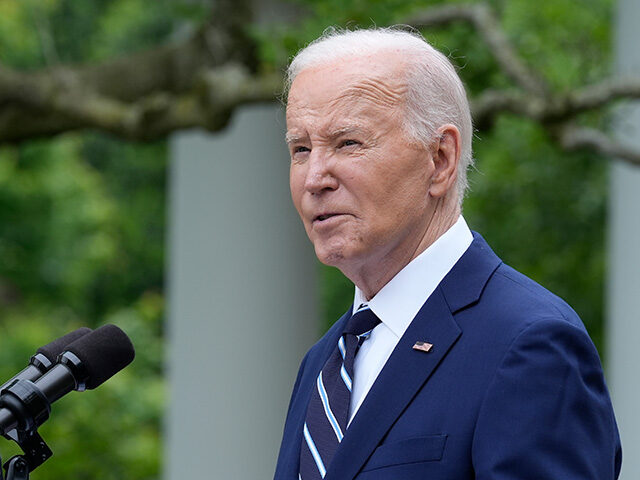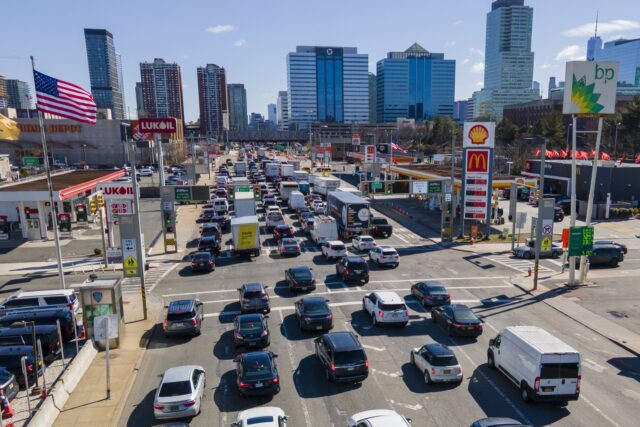from The Hill
Cruel Summer: Consumer Sentiment Plummets as Inflation Fears Grip the Nation
by John Carney
Breitbart.com
 Americans are bracing for a cruel summer as consumer sentiment takes a significant hit, driven the impression that we cannot shake off persistent inflation and the view that the economy is not out of the woods.
Americans are bracing for a cruel summer as consumer sentiment takes a significant hit, driven the impression that we cannot shake off persistent inflation and the view that the economy is not out of the woods.
The University of Michigan’s consumer sentiment index fell to 69.1 in May, a sharp decline from 77.2 in April, marking the lowest reading in five months.
[…] Despite beating the preliminary estimate of 67.4, the final reading for May represents a significant decline from the previous month.
Expectations for inflation have edged up, with Americans now predicting a 3.3 percent increase over the next year, up from 3.2 percent in April. This is still lower than the preliminary reading of 3.5 percent, but the trend is unsettling for both consumers and policymakers.
America in 2024: Fast Food is a “Luxury”, 11 Million Children Live in Poverty, and 1000s of Stores Are Closing
by Michael Snyder
The Economic Collapse Blog
 Little by little, our standard of living has been eroding. A couple decades ago, we had the largest and most prosperous middle class in the history of the world, but now most of the country is struggling. At this point, fast food is considered to be a “luxury”, 11 million children are living in poverty, and thousands of stores are permanently shutting down all over the United States because consumers have so little discretionary income these days. We are in the midst of a historic cost of living crisis, and those at the bottom of the economic food chain are being hit the hardest.
Little by little, our standard of living has been eroding. A couple decades ago, we had the largest and most prosperous middle class in the history of the world, but now most of the country is struggling. At this point, fast food is considered to be a “luxury”, 11 million children are living in poverty, and thousands of stores are permanently shutting down all over the United States because consumers have so little discretionary income these days. We are in the midst of a historic cost of living crisis, and those at the bottom of the economic food chain are being hit the hardest.
The ultra-wealthy don’t really care that food costs have been soaring, but for those that are barely scraping by from month to month it makes an enormous difference.
Once upon a time, fast food restaurants were where those that were struggling went to eat.
Gold Prices Rise as the Dollar Slowly Dies
by Daniel Lacalle
Mises.org
 The money supply is rising again, and persistent price inflation is not a surprise. Price inflation occurs when the amount of currency increases significantly above private sector demand. For investors, the worst decision in this environment of monetary destruction is to invest in sovereign bonds and keep cash. The government’s destruction of the purchasing power of the currency is a policy, not a coincidence.
The money supply is rising again, and persistent price inflation is not a surprise. Price inflation occurs when the amount of currency increases significantly above private sector demand. For investors, the worst decision in this environment of monetary destruction is to invest in sovereign bonds and keep cash. The government’s destruction of the purchasing power of the currency is a policy, not a coincidence.
Readers ask me why the government would be interested in eroding the purchasing power of the currency they issue. It is remarkably simple.
Monetary inflation is the equivalent of an implicit default. It is a manifestation of the lack of solvency and credibility of the currency issuer.
Governments know that they can disguise their fiscal imbalances through the gradual reduction of the purchasing power of the currency and with this policy, they achieve two things: Inflation is a hidden transfer of wealth from deposit savers and real wages to the government; it is a disguised tax.
Fast-Food Prices Have Skyrocketed. Here’s a Look at How Much They’ve Climbed.
If you’re old enough to remember $5 footlongs from Subway, keep reading.
by Brooks Johnson
Star Tribune
Fast food has long been a staple of American diets because it is, or was, so inexpensive.
Not so much anymore.
Over the past five years, prices for popular menu items at chains like McDonald’s and Taco Bell have risen dramatically. The cost of a Big Mac or a Chalupa has doubled since 2019, according to archived and current pages of the Fast Food Menu Prices online tracker.
Restaurant inflation overall has been significant, though much tamer by comparison, with dining-out prices up 30% on average since 2019.
Public’s Positive Economic Ratings Slip; Inflation Still Widely Viewed as Major Problem
Majorities in both parties remain fearful about the state of the country
from Pew Research Center
 Inflation may be cooling, but it continues to loom large over Americans’ evaluations of the country and the economy.
Inflation may be cooling, but it continues to loom large over Americans’ evaluations of the country and the economy.
Today, 23% of U.S. adults say the economy is in excellent or good shape, down from 28% in January but higher than the 19% who rated the economy positively last April.
– The recent negative slide in economic ratings has mainly taken place among Democrats and those who lean to the Democratic Party: 37% rate the economy positively today, down from 44% in January (but up from 28% last spring).
– Republicans and Republican leaners’ views are little changed over this period – only one-in-ten rate the economy positively.
The public again sees inflation as one of the top problems facing the nation, with 62% saying inflation is a very big problem for the country – only slightly down from the 65% who said this last year.
U.S. Economy Picks Up Speed, Defying Fed Attempts to Cool Inflation and Growth
by John Carney
Breitbart.com
 The U.S. economy got a major boost in May, according to the latest S&P surveys. Businesses are feeling good about the future, even with inflation still causing headaches.
The U.S. economy got a major boost in May, according to the latest S&P surveys. Businesses are feeling good about the future, even with inflation still causing headaches.
The S&P flash U.S. services index, which is based on a survey of purchasing managers’ at U.S. businesses, shot up to a 12-month high of 54.8 in May from 51.3 in April. These are the folks buying supplies for their companies, so this is a big deal.
Not to be outdone, the flash U.S. manufacturing PMI climbed to 50.9 in May from 50.0. Anything above 50 means growth, so it looks like things are picking up.
“The US economic upturn has accelerated again after two months of slower growth, with the early PMI data signalling the fastest expansion for just over two years in May,” said S&P Global’s top economist, Chris Williamson.
Price Increases Take a Bite Out of Companies’ Reputation
by Nathan Bomey
Axios
 The public’s dissatisfaction with inflation is boiling over — and some of the biggest consumer brands in the country are feeling the heat.
The public’s dissatisfaction with inflation is boiling over — and some of the biggest consumer brands in the country are feeling the heat.
Why it matters: Record price increases have ebbed, but the aftershocks are still reverberating.
The big picture: Companies such as Walmart, Macy’s, McDonald’s, Burger King, Amazon, Procter & Gamble, Costco, Kraft Heinz, Kohl’s, Nike and Kroger registered a decline in their Reputation Quotient score in the Axios Harris Poll 100 from 2023 to 2024.
“Industries where consumers see price hikes for everyday items have declining trust,” Harris Poll reports.
Zoom in: Trust scores fell by 3.8 percentage points for clothing companies, 3.2 points for quick-service restaurants, 2.9 points for big-box stores and 2.2 points for grocers.
America is On Fire
by Richard Berkowitz
American Thinker
 If Trump listens to the far better team of advisers directing his campaign this time around, I believe he will win by an overwhelming vote tally and will thus be in an excellent position to finish out his next term and accomplish many of his goals. America will be better off in the long run.
If Trump listens to the far better team of advisers directing his campaign this time around, I believe he will win by an overwhelming vote tally and will thus be in an excellent position to finish out his next term and accomplish many of his goals. America will be better off in the long run.
I know this is a sacrilegious thought, but the mass media live happily in their D.C cocoon and the D.C. radical elites cannot dare to face reality.
Biden has always been a fraud, but his “uncle visage,” like Obama’s hip-hop “Music Man” image, fooled the electorate. Well, the results are in and have proven otherwise. The blindfold is finally off and far too many are suffering and discouraged.
America is on fire, and all Biden has is more inflationary gasoline at his disposal.
Polls are often wrong, but this time, I believe they reflect the true story.
Gold Fever is Sweeping China, Plus Another Inflation Wave is About to Hit
from King World News
 Gold fever is sweeping China, plus another inflation wave is about to hit.
Gold fever is sweeping China, plus another inflation wave is about to hit.
“Understanding that China plays the long game is one of the most important insights you can have about what lies ahead. China’s leaders know where they want to be five and ten years out.” — Stephen Leeb
Gold fever in China
May 23 (King World News) – Peter Stoferle at Incrementum: One of the most important factors behind the recent gold boom is undoubtedly the enormous demand from China. Chinese demand for gold is no longer being fueled solely by the PBoC, but increasingly also by Chinese private investors. The financial situation in China could be summarized as “shrinking pool of investment opportunities meets high liquidity”…
Stubborn Inflation & Debt Crisis: Warning of Economic ‘Death by 1,000 Cuts’
from Zero Hedge
 In this episode, host Andrew Brill sits down with Peter Boockvar, Chief Investment Officer at Bleakley Financial Group and author of the Boock Report. Together, they tackle the stubborn inflation gripping the economy, the looming crisis in commercial real estate refinancing, and the risk of a “death by a thousand cuts” scenario.
In this episode, host Andrew Brill sits down with Peter Boockvar, Chief Investment Officer at Bleakley Financial Group and author of the Boock Report. Together, they tackle the stubborn inflation gripping the economy, the looming crisis in commercial real estate refinancing, and the risk of a “death by a thousand cuts” scenario.
Peter shares his strategies for protecting and building wealth amid unprecedented market volatility, offering valuable insights into how to navigate the turbulence ahead. Learn why he believes precious metals, commodities, and international markets can help safeguard your portfolio and where he sees opportunities for significant growth. Did you enjoy this episode? Like, subscribe and let us know in the comments!
Bidenflation: Average U.S. Vehicle Age Hits Record High as Inflation Forces People to Keep Cars and Trucks Longer
by AP
Breitbart.com
 DETROIT (AP) — Cars, trucks and SUVs in the U.S. keep getting older, hitting a record average age of 12.6 years in 2024 as people hang on to their vehicles largely because new ones cost so much.
DETROIT (AP) — Cars, trucks and SUVs in the U.S. keep getting older, hitting a record average age of 12.6 years in 2024 as people hang on to their vehicles largely because new ones cost so much.
S&P Global Mobility, which tracks state vehicle registration data nationwide, said Wednesday that the average vehicle age grew about two months from last year’s record.
But the growth in average age is starting to slow as new vehicle sales start to recover from pandemic-related shortages of parts, including computer chips. The average increased by three months in 2023.
Still, with an average U.S. new-vehicle selling price of just over $45,000 last month, many can’t afford to buy new — even though prices are down more than $2,000 from the peak in December of 2022, according to J.D. Power.
